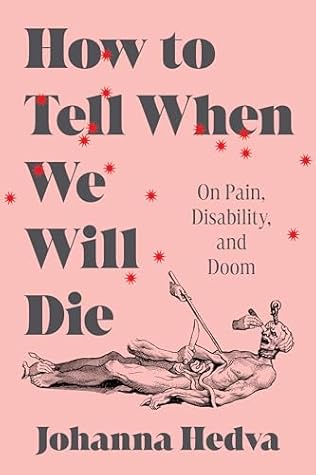More on this book
Community
Kindle Notes & Highlights
Read between
January 2 - January 4, 2025
Masculinity perceives, which means it is the subject, and everything else becomes the object. In other words, the very fact that Z, as the subject, perceived me, as the object, is what made me exist at all.
I have learned that pain is the price I must pay to have such experiences, which is to say that pain is the price I must pay to be awake to life.
It’s that I can think of no greater intent to do care together than a willingness to do pain together, to invite our monstrosities, our leaking guts, our violences to find ways to live under the same roof.
In the disabled community, we prefer the word “capacity” to “capability.” Yes, you might be capable of doing something, but do you have the capacity for it in this moment?
But these stories have become cud chewed by the literary-biography-industrial complex. Their struggles have been capitalized upon, commercialized, rendered symbolic rather than real, images without depth, icons without clay feet.
Capitalism is an evil genius. It has succeeded in making us think there’s a difference between our needs and our desires— but it makes us pay for both.
Icarus flew too close to the sun because he was trying to flee the conditions he was born into. His father’s warning not to fly too close to the sun was not, as it is now said to be, an admonishment to keep Icarus in his place, proof that Daedalus did not support his son’s ambition. The father was trying to help his son—he’d made the wings after all—by offering advice to ensure his son could escape their family’s enslavement and be free.
When I found her cane, I started crying. That she needed it, that I need it too.
What I will never forgive myself for is how close I was coming to forgiving her, how I was almost there, but not yet.
I am alive today because, in 2013, I met a man who loved me more than I’d ever been loved before, more than he’d ever loved before. We are still loving each other now; we have the same name. He is not in this book because this is a book about pain, and he has given me none.
When humans invented gods, we also invented the concept, the possibility, of disobeying them.
Deborah Levy has said that the things we don’t want to know are the things we already do.
The trick is to know that these big hard parts are important to the story—and in some versions, they are the entire story—and it’s okay to take breaks, feel furious, sob for hours. The grief never stops. Neither does care, if you let it.
But when you’ve been poor your whole life, and are descended from generations marked by it, you become street smart. You know a scam when you see one because the whole world has been scamming you since birth. You’ve perpetrated plenty of little ones yourself.
I don’t want to do meaningful work with editors, curators, agents, or organizers whom I wouldn’t also want to have a long dinner with, go dancing and get sweaty with, talk about heartbreak, desire, and ambition with.
What I mean is, what I wanted “Sick Woman Theory” to change was the world, but it only ended up changing me.
I’ve found that, as my cultural capital increases, if I insist on certain accessibility requirements, not in the name of the audience who might need them but for myself, I am more likely to get them. This is because riders are traditionally used by divas and rock stars, and this is an economy that institutions understand—the economy of idiosyncratic spectacle, of throwing one’s weight around, of power.
My Access Rider is not about sharing the load so that we can suddenly be in the black—it’s about redefining what being in the red means, what being insolvent to each other does, and it’s about acknowledging that we will always be there, covered, totally, in red.
I see that I will never fit into that mythical universal subject of the man who shapes his own destiny unburdened by anything but his own will. The other side of that truth is that I don’t think the world will ever let me be something other than the Sick Woman. The only consolation, at this point, is to make space for that paradox, that capacity for shape-shifting.
Much of this book was written on unceded Chumash, Tongva, Kizh, and Tataviam territories. I also want to acknowledge that a land acknowledgment is not the same as land.
Thank you to those who’ve trolled me online—I find having enemies so helpfully clarifying.


